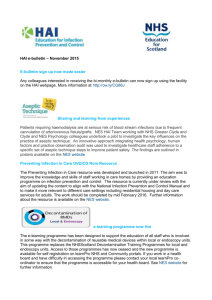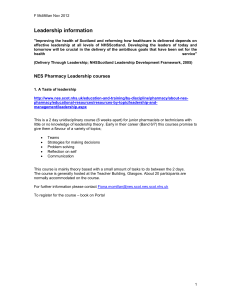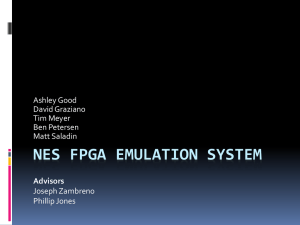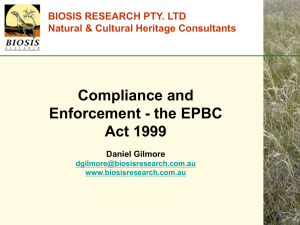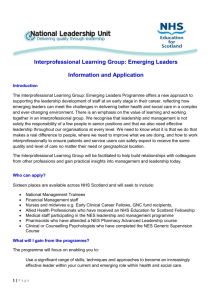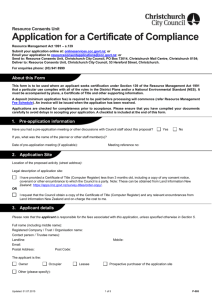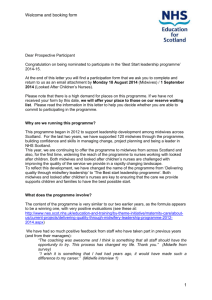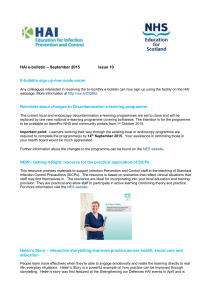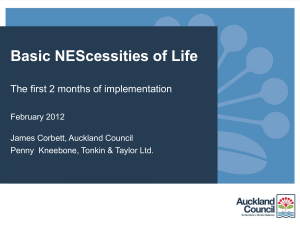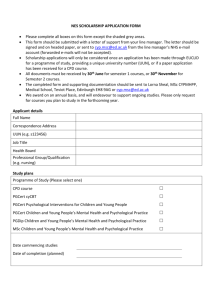clinical hcsw supporting learning fund
advertisement
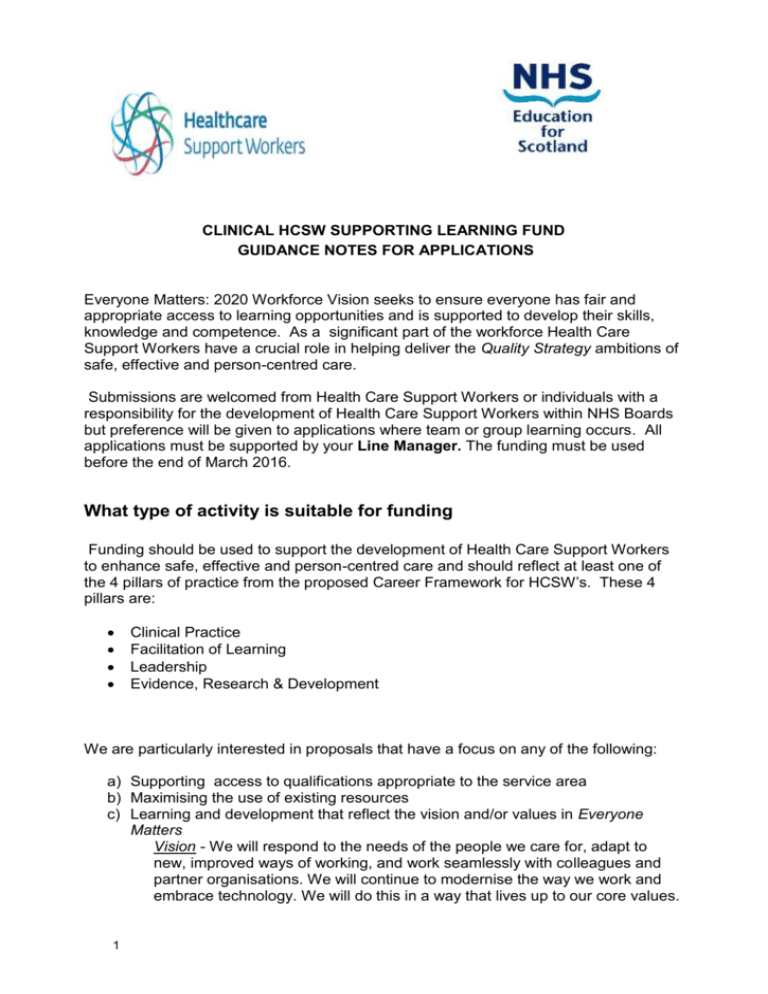
CLINICAL HCSW SUPPORTING LEARNING FUND GUIDANCE NOTES FOR APPLICATIONS Everyone Matters: 2020 Workforce Vision seeks to ensure everyone has fair and appropriate access to learning opportunities and is supported to develop their skills, knowledge and competence. As a significant part of the workforce Health Care Support Workers have a crucial role in helping deliver the Quality Strategy ambitions of safe, effective and person-centred care. Submissions are welcomed from Health Care Support Workers or individuals with a responsibility for the development of Health Care Support Workers within NHS Boards but preference will be given to applications where team or group learning occurs. All applications must be supported by your Line Manager. The funding must be used before the end of March 2016. What type of activity is suitable for funding Funding should be used to support the development of Health Care Support Workers to enhance safe, effective and person-centred care and should reflect at least one of the 4 pillars of practice from the proposed Career Framework for HCSW’s. These 4 pillars are: Clinical Practice Facilitation of Learning Leadership Evidence, Research & Development We are particularly interested in proposals that have a focus on any of the following: a) Supporting access to qualifications appropriate to the service area b) Maximising the use of existing resources c) Learning and development that reflect the vision and/or values in Everyone Matters Vision - We will respond to the needs of the people we care for, adapt to new, improved ways of working, and work seamlessly with colleagues and partner organisations. We will continue to modernise the way we work and embrace technology. We will do this in a way that lives up to our core values. 1 Together, we will create a great place to work and deliver a high quality healthcare service which is among the best in the world. Values • Care and compassion • Dignity and respect • Openness, honesty and responsibility • Quality and teamwork. d) Supporting new ways of working in the context of integration e.g. personal outcomes What can the funding be used for? The funding must demonstrate positive impact for people experiencing health care and/or family carers and Health Care Support Workers and can be used in a number of ways, for example : Releasing Health Care Support Workers from practice to undertake learning activities Paying for attendance at relevant conferences/courses Purchase of learning materials Accessing qualifications Support to learn from other practice areas to enhance own practice Examples of previous successful bids Development of Clinical Champions - promoting the Induction Standards and Code of Conduct for HCSWs. Training developed on safe and early anticipation, detection and care of the acutely ill and deteriorating patient in relation to observational skills. Providing a training and development opportunity for HCSWs relating to dealing with difficult conversations. The funding allowed 12 HCSW’s to be backfilled so as complete the Level 2 SVQ unit HSC214 Help individuals to eat and drink. Your application must clearly state the learning objectives and the intended impact/ outcomes that it will achieve. Line Manager support is a pre-requisite for successful funding applications. The application process is split into two forms: Form A should be completed collaboratively by the nominated main applicant and their line manager in collaboration and with the consent of the participants within their group/team. Each participant must have the consent and support of their own line managers. Completed applications must be submitted to NES by the closing date. 2 Form B will be sent by NES to the identified line manager for each application received. The Clinical HCSW Supporting Learning Scheme is currently accepting applications. The closing date for submission of applications (Form A) is 12.00pm (noon) on Friday 31s July 2015. Please note: It is an expectation that individuals/teams who receive funding will share their learning with others at local and national level. This could include preparing a poster presentation, presenting at a local or national event, or providing information to be added to the NES Health Care Support Worker website. If you want to discuss your application please contact the HCSW team HCSW@nes.scot.nhs.uk All applications with line manager support will be considered by 15th August 2015. All applicants will be notified of outcomes by 31st August 2015. Data Protection NES uses the personal data you provide for purposes associated with administering the Clinical HCSW Supporting Learning Fund, including evaluation and impact assessment. NES will add your details to our database and share your work contact details with other participants in the scheme. If you would prefer us not to share your contact details, please contact the HCSW Project Team: HCSW@nes.scot.nhs.uk For more information see http://www.nes.scot.nhs.uk/privacy-and-data-protection Personal data will be retained in line with NES records retention policies. 3 GUIDANCE FOR COMPLETION OF FORM A FORM A – SECTION A - to be completed by the lead applicant Question 1 Please provide NES with all the necessary contact details so we can consider your application. Question 2.1 The NES HCSW Project Team recognises the emphasis put on collective learning as well as an opportunity for individuals to engage in quality learning experiences. The funds can be used to provide individual or team applicants with funds to pay for course fees and associated costs and/or to pay for other education and development activities. Please indicate if your application is for a team or for an individual. Please tick the relevant box that describes the type of application you or your group/team is submitting at this time. If you have any query regarding an application you are submitting please contact us at HCSW@nes.scot.nhs.uk Questions 2.2 and 2.3 At NES we are keen to ensure our education and development opportunities are available across the range of professions, healthcare settings and geographical areas. As a publicly funded body we have a legal duty to ensure equality and diversity of opportunity. To preserve confidentiality you will be asked to complete an equality monitoring form which we will send to you on receipt of your application but will not be linked to your application. a. Question 2.2 Please indicate the care setting(s) that you (and/or your team) work. If you work across a range of settings please select all that are relevant. If you work with children in a health centre or with adults in an acute hospital setting, as well as with outpatients, please indicate all that are relevant. If you do not see your care setting indicated, select other and specify your area. b. Question 2.3 Please indicate the geographical area that best describes your work setting. Question 2.4 The Career Framework is not to be confused with the Agenda for Change bandings. The Framework sets out nine levels that apply to all staff within the health service, unlike Agenda for Change the Framework also applies to medics, dentists and senior managers. Clinical support workers are likely to be working at level 2, 3 or 4 on the Career Framework. Again this is not necessarily the same as the Agenda for Change banding. Some Assistant Practitioners working with delegated responsibilities in roles that 4 demand a degree or equivalent may well be banded at band 5, e.g. assistant psychologists others may be banded 3 or 4. For more details about the various levels of support staff you might want to refer to the Healthcare Support Worker Toolkit at http://www.hcswtoolkit.nes.scot.nhs.uk Career Framework for Health Support Workers and Assistant Practitioners Question 2.5 The Clinical HCSW Supporting Learning Fund is a flexible scheme to be used to support the best way of learning and development that suits your needs. Education and learning can take many forms and is not restricted to attending a college or university for a more traditional course. Development activities may be work based and involve time in undertaking tasks that link to priority areas including identifying learning needs of others. This section must relate to the learning activities you or your group/team . 5 Learning may include one or more of the following activities: practice-based learning – As group/team/applicants do you need to have some time to learn together? You might want to participate in some online learning or have the resources necessary to work together on a project. As an individual learner is your application to cover your time needed to undertake a project within your workplace? “MacKay” experiential placement learning – Rhoda Mackay, AHP PEL for Western Isles has developed and piloted placements as a form of learning and development- hence the term “MacKay” experiential placement learning. Placements are a familiar form of learning for pre-registration AHP students and the practice education placement is often one of the most powerful and memorable learning experiences however it is rarely used as learning tool at other stages in AHP careers. For more information see the link below: http://www.nes.scot.nhs.uk/media/539706/placement_book_-_final.pdf Developing qualifications – potential practice education opportunity to lead on the development of a new qualification by conducting market research whilst participating in education that provides the underpinning theoretical knowledge to enhance the quality of the qualification you are helping to develop. Question 2.6 Please provide more details about your learning plans so the Review Panel who consider your application have a full understanding of your plans, the reasons behind your learning plans and how you intend to carry out your learning activities. This is especially relevant if your application relates to practice-based learning and undertaking a project. Question 2.7 Being clear about the intended learning outcomes is important to ensure you as an individual or your team mates gain value from your experience. The learning outcomes should be specific, measurable, achievable, relevant and time-bound (SMART). Think about what you will be able to do as a result of your learning. Make sure you link your learning outcomes to your service and show how your learning will have an impact in your workplace e.g. applying research skills to improve the evidence base of your interventions. For more guidance about learning objectives and learning outcomes see the “Test for the Best” resource on the NES website at http://www.test4best.scot.nhs.uk/ Question 2.8 Checking or assessing that you have achieved your learning outcome is an important part of the learning process. If you are planning to undertake a formal qualification it is likely the assessment will also be formal, e.g. submit papers, case studies etc. However, your learning outcomes should also connect to the service you provide and you should include work based learning outcomes you intend to achieve. If you are planning a practice-based learning opportunity or a “Mackay” placement, please refer to the additional “Mackay” placement learning booklet on the NES website http://www.nes.scot.nhs.uk/media/539706/placement_book_-_final.pdf 6 Question 2.9 The main beneficiaries of a well-educated workforce are the people and their families who rely on high quality health services. Person centredness is a key starting point for providing health services but people who use heath services have a key role to play in influencing staff learning. Thinking about your learning as a cycle of activity, if you put service users in the centre, which aspects of the Clinical HCSW Supporting Learning Fund learning activity could include service users and their families? Identify learning need Content of learning, devising learning activities Recruit people to facilitate learning Evaluate impact of learning Deliver learning activities Recruit learners.Is this a collaborative learning opportunity? Question 2.10 Please confirm that the learning opportunity has been identified and agreed through your KSF and PDP. Your line manager will be asked to supply further details. Question 2.11 Please indicate if your intended learning activities will assist you to develop your leadership skills, research/evaluation skills, facilitating learning skills and/or your clinical or professional expertise. Your learning activities should clearly match one or more of the proposed Pillars of Practice from the proposed Career Framework for HCSW’s. The Pillars of Practice structure involves developing skills in a range of dimensions: a. Leadership: skills including policy awareness, leadership styles, team leading, service development and re-design are all examples of this dimension and demand leadership abilities 7 b. Clinical practice: increasing your knowledge, skills and expertise in a particular clinical area is perhaps the most obvious area of career development. You might want to undertake learning activities that increase your understanding of a particular intervention or assessment tool or of a particular condition or impairment. c. Research and evaluation: the increasing emphasis on evidence based practice and quality outcomes demands staff are research savvy and research active. Your project might include how you translate research evidence into practice or involve you in understanding research methods to be better able to read and interpret research information. Your activities might include conducting some research. d. Facilitating learning: HCSW’s have a key role as educators. You may have a formal teaching role or may be involved in educating the patients, students, service users and their families. Teaching and training others whether colleagues, staff from other agencies, students and/or staff you supervise all demand an increasing knowledge on your part of learning and teaching. Question 2.12 If the identified learning opportunity requires funds to be available to a service provider or Board, please provide finance contact details including the name of the provider, address, telephone number and e-mail address, together with start dates of the course. NES will pay course fees direct to the provider and this information will speed up the process for successful applications. To assist the Review Panel in considering your choice of provider, please provide the rationale for selecting the provider specified, particularly if the provider is out with Scotland. If the learning you want to undertake is available in Scotland the Review Panel prefers that you access courses here. Questions 2.13 Please note funding must be used by March 31st 2016. Please identify any additional sources of funding contributing to the overall costs of the project. Depending on the volume of applications received NES may be able to fund all of your requirements or make a contribution towards the funds you require. The Clinical HCSW Supporting Learning Fund is exclusively in respect of development activities. NES must comply fully with all audit requirements and as such please do not include general headings such as sundries, and do not apply for stationery or IT equipment. Where costs involve course fees to a training organisation, NES will pay these directly to the provider via a contract/purchase order. However, you MUST also apply to the external training organisation for a place on the course. By agreeing to fund your application NES does not guarantee you gain a place as this is an academic decision taken by the learning provider. 8 If there is a contribution of funding from other sources please let us know this. Please remember the panel has the option to recommend that your application is supported in full or a contribution towards the costs can be recommended. Question 2.14 Your application must have the support of your line manager. Question 2.15 If your application is successful, you will be expected to submit learning reports to NES. If your work is work-based learning NES will provide project management templates to help you deliver your project and meet our goals. Part of this will include templates and a suggested format for a reflective learning report. For all applicants, undertaking the learning will involve you applying your learning into practice. Careful consideration of all who will be affected by this anticipated change in your service delivery is an important part of developing an effective communication strategy so you are successful in maximising the benefits of the learning you undertake. Thinking about who, then what and how you will need to communicate will be crucial to your success. You will therefore be asked to submit a reflective report outlining your learning experience and outcomes, any barriers incurred and how these were overcome. If you contribute to any publications, e.g. posters or articles, as a result of your learning please note that the NHS Education HCSW Project Team should be informed as well as funding acknowledged and cited. Question 2.16 Please identify how the proposed project was identified as a learning need/gap FORM A – SECTION B - to be completed by the applicant’s line manager Question 3 Please provide NES with all your necessary contact details as line manager of the applicant so we can consider the application. 9 Question 4.1 The Clinical HCSW Supporting Learning Fund is designed to support role development for HCSW’s. Please provide your reasons for supporting the application and indicate how you feel the learning opportunity will benefit the individual, the team and your service. You may also find it useful to refer to the guidance notes for questions 2.5-2.9 in the applicant’s section of the application form guidance notes. This sets out the Career Framework and related career dimensions. Questions 4.2 The Skills Maximisation Toolkit is provided via the NES website to assist you in considering skill mix. Please indicate how you plan to utilise the learning gained by the applicant. http://www.nes.scot.nhs.uk/education-and-training/by-discipline/allied-healthprofessions/resources,-publications-and-useful-links/skills-maximisation-toolkits.aspx Applications must demonstrate impact on service. Where the application, for example, is for extended practice any role development for the individual and the impact for roles developing across the team will be especially welcome. Question 4.3 Line Managers play a critical role in supporting applicants who apply to the Clinical HCSW Supporting Learning Fund. As part of the application process you are asked to provide verification and support. If the applicant is successful in securing funding, as their line manager you will be required to support them by committing to their learning experience by providing them with protected time (where appropriate) and offering pastoral and professional support throughout their Fellowship experience. If you are unable to support the application you will need to contact the applicant directly to discuss the reasons with them as they will not be able to apply without your endorsement. Question 4.4 The Quality Strategy sets out the clear responsibility on NHSScotland to focus on the outcomes and benefits that will result from our activity. This is not only true for our clinical input to patients and clients but also refers to our education and learning activities. Please ensure you are clear about the impact you expect the learning to have and indicate how this could be measured. 10 Question 4.5 All publicly funded activities must now by law aim to promote equality and diversity. Please explain how you have ensured that there will be equality of opportunity for all in relation to the equality strands (e.g. race, disability, gender, age, sexual orientation, religion and belief). The close link between women workers and part time working for example means access to applying to the scheme and the support you provide should be equal and not unfairly advantage full time over part time staff. Question 4.6 Line Managers play a critical role in supporting applicants who apply to the NES Supporting Learning Fund for clinical HCSW’s. As part of the application process you are asked to provide verification and support. If the applicant is successful in securing funding, as their line manager you will be required to support them by committing to their learning experience by providing them with protected time (where appropriate) and offering pastoral and professional support throughout their Fellowship experience. If you are unable to support the application you will need to contact the applicant directly to discuss the reasons with them as they will not be able to apply without your endorsement. 11
